Bosch microwave not heating. You may have a bad diode in your Bosch microwave. In a microwave, when the diode burns, the magnetron will not receive adequate voltage.
Microwaves stop heating when this happens. The diode needs to be checked out and replaced if needed by a licensed technician to prevent the risk of shock because some parts of your microwave (such as the magnetron) can house dangerous amounts of electricity.
Below you will find more information about why your appliance isn’t working and how troubleshooting can help you fix it despite any issues that are causing problems for your Bosch microwave, not heating.
Bosch microwave not heating
We will discuss here in this post how you can troubleshoot issues with your Bosch microwave, not heating so that you can get it up and running again at full capacity.
Issue with Diode
The diode turns the AC power from the transformer to DC, doubling the voltage to over 4,900 volts. In order to heat the food, the magnetron is powered by this high voltage.
The magnetron inside this microwave won’t be able to operate if a diode burns out, thus preventing food from being heated. When it happens, it is often visibly burned out and unusable due to temperature changes and UV exposure.
If inspecting damages proves inconclusive then test if there are still any working diodes within by changing polarity with a 9V battery or just removing one of its legs completely. Replace only if there is a visual change in behavior when connected backward with the same battery.
Thermal Fuse is blown
The thermal fuse is how this microwave produces a nice, steady heat in your cuisine and prevents the microwave from burning anything.
The thermal fuse is responsible for cutting off the power to the microwave if it gets too hot, preventing any potential fire hazards. A multimeter can be used in order to test a thermal fuse for continuity if the thermal fuse doesn’t have enough conduction going through it must be replaced.
A note of caution: This microwave oven continues to store thousands of volts in its high voltage capacitor even after being unplugged (the info also gives a tip on using a multimeter).
Problem with Magnetron
Magnetrons generate microwave frequencies using high voltages and high currents of DC power. As a result, the microwave will not be heated.
The magnetron is not repairable if it is burned out, you must replace it since other components in the microwave can be harmed if they receive incorrect frequencies.
Take extreme care when replacing the magnetron because there are dangerous voltages stored inside of it even after being unplugged; only a licensed technician should attempt to replace the magnetron.
Door switches does not have continuity
Most microwaves have three or four-door switches. When you close the microwave door, the switches twitch in a certain sequence to make certain the door is completely closed.
If a switch is out of whack, it can stop the microwave from starting or heating up food. To determine if any of the door switches are out of order, check each one using a multimeter to see if they are connected correctly.
If a switch doesn’t connect correctly with its partner, it should be replaced as soon as possible.
Replace Main Control Board
The main control board may not be the reason why your dishwasher is not working. In fact, it’s rarely the case. Control boards are often misdiagnosed before being fixed and it’s a waste of money and other things that you need to pay attention to now.
Prior to replacing the defective control board, ensure that all other components are functioning properly.
Faulty High Voltage Capacitor
The high voltage capacitor is important to the operation of your microwave because it works with a high voltage diode to convert the energy that comes out of your transformer into a DC current.
Without the proper amount of storage capacity, your microwave won’t be able to produce enough power when you need it, which would result in either too low or too high of a temperature being delivered when your fuse doesn’t blow and you decide to warm up some leftovers.
The best way to see if your high voltage capacitor may be defective is by using an ohmmeter with X1A1000 capability from top to bottom and from side to side. If you find any areas that yield under 20 ohms, then yet again it’s probably time for a new one.
Bosch microwave not heating
Related Guides
